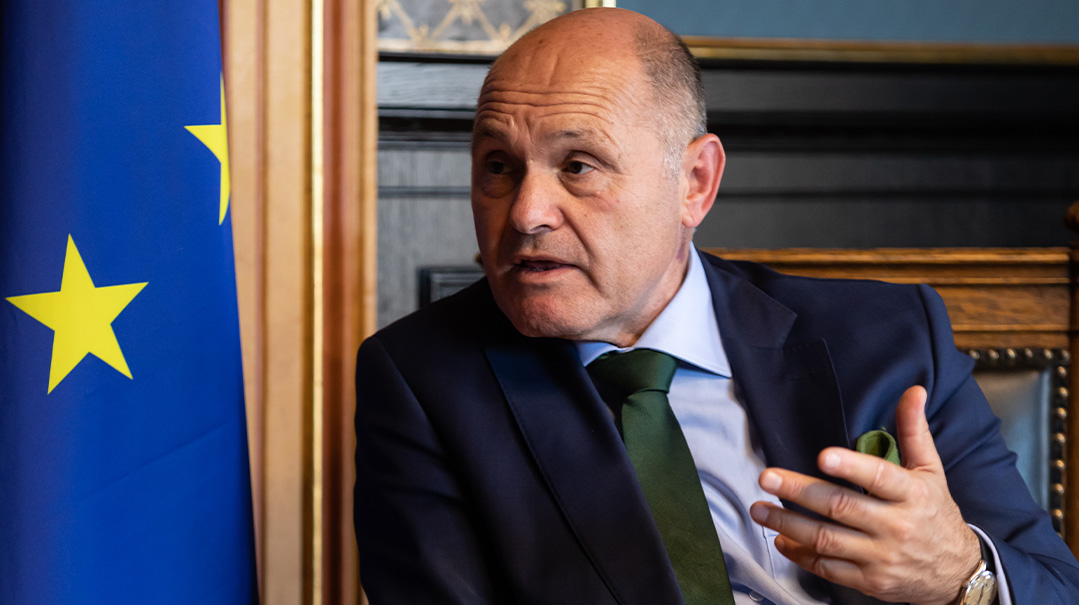Our Nation’s Duty

Wolfgang Sobotka, president of Austria’s parliament, steers his country from its Nazi past

Binyamin Rose, Vienna, Austria
Photos: Ouriel Morgensztern
Wolfgang Sobotka was 14 years old when his peers started taunting him, calling him “Nazi Bua,” street slang in Austria for “Nazi Boy.”
At first, the youthful Sobotka didn’t know what to make of it. This was in 1970, and World War II had been over for more than 25 years. Austria was an independent sovereign state that had long since cut the cord of its wartime ties with Nazi Germany. Austria’s Social Democratic Party was leading a stable parliamentary democracy, and its party chairman, Bruno Kreisky, had just become the country’s first Jewish chancellor.
What did Sobotka’s peers know that he didn’t?
“I had no idea what it meant, so I began to research my family,” Sobotka said.
Until that point, Sobotka knew little about his family’s background. His father was wounded on the frontlines during World War II, but even though he fought in the armies of the Rome-Berlin Axis, his heart and soul weren’t in it.
“My father was very democratic, but he never talked to me about his past until almost the end of his life,” Sobotka said.
And when he did, he shared two important pieces of information with his son.
The first is that his grandfather was imprisoned during the days of the First Republic, which was carved out at the end of World War I from the breakup of the more than 600-year rule of the Hapsburg Monarchy. It was a period marked by political and economic turmoil in all of Europe, but especially in Austria. Unemployment peaked at 50 percent. Food was scarce. The social distress and poverty led to heightened political instability and served as a breeding ground for political extremism.
Until his death in 1943, Sobotka’s grandfather was a hard-core, ideological National Socialist (Nazi) who bought into the totalitarian mindset, as did many in those days, hoping that an all-powerful central government could solve Austria’s problems.
The second piece of information that Sobotka learned about his grandfather was the existence of a handwritten letter with a shocking piece of advice to his heirs.
“I was told that he broke with the party, but on his deathbed, he wrote a short letter to his three children, which said: ‘Don’t trust the party, all of them are corrupt, but you have to trust Adolf Hitler.’ It was unreal for me to see that,” Sobotka said.
Unable to obtain any more information from his father, the young Sobotka set off for the archives of the Documentation Centre of Austrian Resistance to try to uncover more chapters of his family history.
Whatever he found, he keeps confidential, and he shared nothing further during our recent 30-minute interview at Vienna’s elegant Palais Epstein. Built as a mansion for a prominent Jewish businessman in 19th-century Vienna, today the rooms of Palais Epstein are used as offices and venues for meetings and events, as well as reception rooms for the president of the parliament.
Sobotka’s official title is President of the Austrian National Council, the most powerful branch of the Austrian parliament. While the National Council is elected directly, by popular vote, it is the members of the council who vote for council president. After the 2017 general election, the Council elected Sobotka as president, along with a second and third president who share parliamentary responsibilities. Sobotka is the highest ranking among the three, and in Austria, the council presidents are considered the second-highest ranking political positions in the country. Sobotka’s status can be compared to that of Speaker of the House in the US Congress, but the job entails more than that, as it also calls for the additional responsibilities of preparing the national budget and setting the legislative agenda.
Sobotka is a member of the Austrian People’s Party (OVP), a center-right party that is currently the senior partner in the ruling coalition with the Green Party.
Many of our readers gained familiarity with the OVP when Sebastian Kurz was its leader.
Kurz was forced to resign a year ago due to a financial scandal that touched him, but the close ties he formed with Israel and former prime minister Netanyahu were a highlight of his short rule.
Wolfgang Sobotka is also a man of many other talents. He studied history at the University of Vienna, and music at Vienna’s University of Music and Performing Arts. He has conducted orchestras at the Bruckner Conservatory, in Linz. He held several teaching jobs early in his career, and served as city archivist in his hometown of Waidhofen an der Ybbs, which contains documents dating back to 1355. His first elective office was as a member of the Waidhofen town council.
Sobotka may choose to keep his family history private, but he was completely candid in his assessments of anti-Semitism in modern-day Austria and throughout Europe, and made no effort to whitewash the phenomenon. He displayed a clear understanding of the long history, the context, and all of the current manifestations of the oldest form of hatred known to the human race. And in that context, he understands well that it’s a battle that may not be won, but must be fought.
Oops! We could not locate your form.







